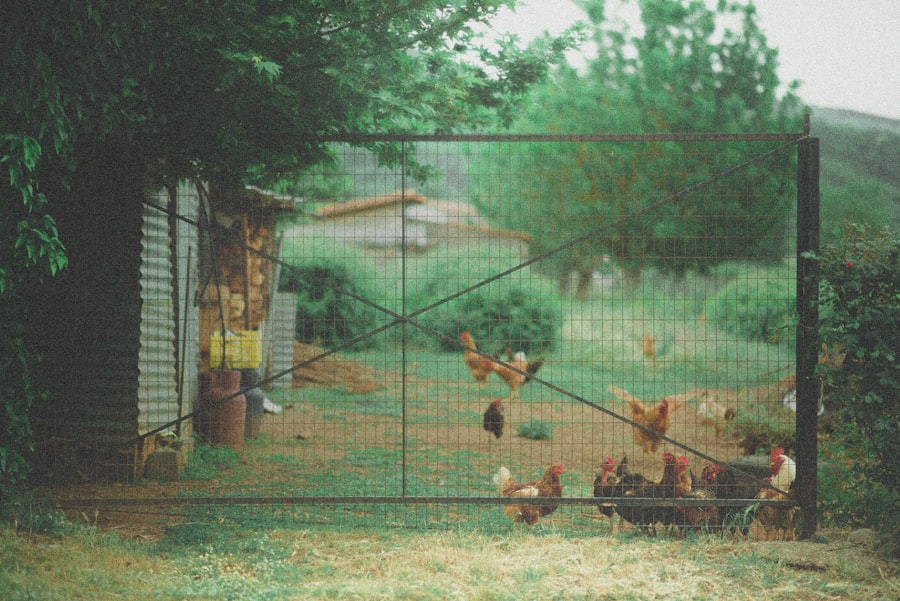Addressing aggressive behavior in chickens requires understanding its root causes. Aggression can result from various factors, including overcrowding, resource scarcity, and disruptions in social hierarchy. Chickens are social animals with a natural pecking order, and disturbances to this order can lead to aggressive behavior.
Insufficient space, food, or water can cause stress, potentially triggering aggression. Breed characteristics and individual personalities also play a role, as some breeds may be more prone to aggression than others. Environmental factors such as temperature, lighting, and predator presence can contribute to aggressive behavior in chickens.
Identifying these underlying causes is crucial for addressing and preventing aggression effectively. By recognizing the source of the problem, chicken owners can take proactive measures to create a more harmonious living environment for their flock. Stress and fear can also lead to aggressive behavior in chickens.
Exposure to stressful situations like loud noises, sudden movements, or unfamiliar surroundings may cause agitation, resulting in aggressive behavior as a self-defense mechanism. Chicken owners should be aware of their flock’s environment and take steps to minimize potential stressors. Understanding these root causes allows owners to implement effective strategies for creating a more peaceful and harmonious living environment for their chickens.
Table of Contents
Key Takeaways
- Understanding the root of the problem is crucial for addressing aggression in chickens
- Creating a spacious living environment can help reduce stress and aggression among chickens
- Providing sufficient food and water is essential for maintaining a harmonious chicken flock
- Introducing new chickens properly can minimize conflict and aggression within the flock
- Offering enrichment and distractions can help redirect aggressive behavior and keep chickens engaged
Creating a Spacious Living Environment
Reducing Aggression through Space and Territory
One of the most effective ways to address and prevent aggressive behavior in chickens is by providing them with a spacious living environment. Overcrowding can lead to competition for resources and territorial disputes, which can result in aggressive behavior among chickens. By ensuring that chickens have ample space to move around and establish their own territories, owners can reduce the likelihood of aggression within the flock.
Designing a Well-Functioning Coop and Outdoor Area
In addition to providing adequate space, it’s important to create a well-designed coop and outdoor area that allows for natural behaviors such as scratching, dust bathing, and perching. This not only promotes physical and mental well-being but also helps to reduce stress and aggression in chickens. Owners should also consider providing multiple feeding and watering stations to prevent competition for resources and minimize the risk of aggressive behavior.
Creating a Comfortable and Secure Environment
Furthermore, creating a spacious living environment also involves providing adequate ventilation, natural light, and protection from predators. A well-ventilated coop with access to natural light can help maintain a healthy and comfortable living environment for chickens, reducing the likelihood of stress-induced aggression. Additionally, ensuring that the coop is secure from predators can help alleviate fear and anxiety in chickens, further reducing the risk of aggressive behavior.
By creating a spacious living environment that meets the physical and behavioral needs of chickens, owners can significantly reduce the likelihood of aggression within their flock. Providing ample space, resources, and environmental enrichment is essential in promoting a peaceful and harmonious living environment for chickens.
Providing Sufficient Food and Water

Another crucial aspect of addressing and preventing aggressive behavior in chickens is ensuring that they have access to sufficient food and water. Competition for resources such as food and water can lead to aggression within the flock, as chickens may become territorial and protective of these essential resources. By providing multiple feeding and watering stations, owners can minimize competition and reduce the likelihood of aggressive behavior among their chickens.
It’s important to ensure that all chickens have equal access to food and water, especially in multi-bird households where dominant individuals may monopolize these resources. Owners should monitor feeding and drinking behaviors to ensure that all chickens are able to eat and drink without being intimidated or bullied by more dominant flock members. Additionally, providing a balanced diet that meets the nutritional needs of chickens is essential in promoting overall health and well-being, which can help reduce stress-induced aggression.
Furthermore, owners should regularly clean feeding and watering stations to prevent contamination and ensure that chickens have access to clean and fresh resources. Dirty or contaminated food and water can lead to health issues and discomfort, which can contribute to stress and aggression in chickens. By maintaining clean and hygienic feeding and watering stations, owners can promote a healthy living environment that minimizes the risk of aggressive behavior within the flock.
In summary, providing sufficient food and water is essential in addressing and preventing aggressive behavior in chickens. By ensuring equal access to resources, offering a balanced diet, and maintaining clean feeding and watering stations, owners can create a harmonious living environment that promotes overall well-being and reduces the likelihood of aggression within their flock.
Introducing New Chickens Properly
Introducing new chickens into an existing flock can be a delicate process that requires careful planning and consideration. Improper introductions can lead to aggression and conflict among chickens, as established flock members may view newcomers as intruders and become territorial or defensive. To prevent aggression during introductions, it’s important for owners to follow proper protocols and gradually acclimate new chickens to the existing flock.
One effective strategy for introducing new chickens is to initially keep them separated from the existing flock while allowing visual contact through a wire barrier. This allows chickens to become familiar with each other without direct physical interaction, reducing the likelihood of aggressive behavior during the initial introduction phase. Once the new chickens have had time to acclimate to their surroundings and establish a visual connection with the existing flock, owners can gradually introduce them into the same living space under close supervision.
It’s also important to introduce new chickens during a time when the existing flock is relatively calm and not experiencing any major disruptions or stressors. This can help minimize tension and reduce the likelihood of aggressive behavior during introductions. Additionally, providing multiple feeding and watering stations during the introduction process can help prevent competition for resources and minimize conflict among chickens.
By following proper introduction protocols and gradually acclimating new chickens to the existing flock, owners can reduce the risk of aggression and conflict during this transitional period. Patience, careful observation, and proactive management are key in ensuring a smooth integration process that promotes harmony within the flock.
Offering Enrichment and Distractions
Providing enrichment and distractions for chickens is an effective way to reduce stress and prevent aggressive behavior within the flock. Chickens are naturally curious and active animals that benefit from mental stimulation and opportunities for natural behaviors such as scratching, pecking, and dust bathing. By offering enrichment activities and distractions, owners can help alleviate boredom and reduce the likelihood of aggressive behavior stemming from frustration or pent-up energy.
One way to provide enrichment for chickens is by offering various types of toys or objects that encourage natural behaviors such as pecking or scratching. For example, hanging treats or vegetables from strings or placing objects such as logs or branches in the coop can provide opportunities for chickens to engage in natural foraging behaviors, keeping them mentally stimulated and physically active. Additionally, allowing chickens access to an outdoor area where they can explore, forage, and engage in natural behaviors is an excellent way to provide enrichment and reduce stress.
Outdoor spaces also offer opportunities for environmental enrichment such as providing access to dust bathing areas or natural vegetation for pecking and scratching. Furthermore, rotating enrichment activities on a regular basis can help maintain interest and prevent habituation, ensuring that chickens continue to benefit from mental stimulation and physical activity. By offering a variety of enrichment options that cater to different natural behaviors, owners can create a more stimulating living environment that reduces the risk of stress-induced aggression within the flock.
In summary, offering enrichment activities and distractions is an important aspect of promoting mental stimulation and reducing stress in chickens. By providing opportunities for natural behaviors such as foraging, scratching, and pecking, owners can help alleviate boredom and frustration while reducing the likelihood of aggressive behavior within their flock.
Monitoring and Addressing Aggressive Behavior

Identifying Aggressive Behavior
By closely observing their flock’s interactions, owners can identify potential conflicts or signs of stress-induced aggression before they escalate.
Intervening and Managing Aggressive Behavior
When aggressive behavior is observed within the flock, it’s important for owners to intervene promptly to prevent further escalation. This may involve temporarily separating aggressive individuals from the rest of the flock or providing distractions to redirect their focus away from potential triggers. Additionally, addressing potential underlying causes such as overcrowding or resource competition can help alleviate stress and reduce the likelihood of aggressive behavior among chickens.
Proactive Strategies and Seeking Professional Advice
Owners should also consider implementing management strategies such as providing hiding spots or barriers within the coop where subordinate individuals can seek refuge from more dominant flock members. This allows chickens to escape potential conflicts and reduces the risk of injury or prolonged stress due to aggressive interactions. Furthermore, seeking professional advice from a veterinarian or experienced poultry specialist may be necessary if aggressive behavior persists despite proactive management efforts. A professional can provide valuable insights into potential underlying health issues or behavioral concerns that may be contributing to aggression within the flock.
Seeking Professional Help if Necessary
In some cases, addressing aggressive behavior in chickens may require professional assistance from a veterinarian or experienced poultry specialist. If proactive management strategies have not been effective in reducing aggression within the flock or if there are concerns about potential underlying health issues contributing to aggressive behavior, seeking professional help is essential in addressing the issue. A veterinarian with experience in poultry health can conduct thorough examinations to rule out any underlying health issues that may be contributing to aggressive behavior in chickens.
This may involve assessing for signs of illness or injury that could be causing discomfort or stress within the flock. Additionally, consulting with an experienced poultry specialist can provide valuable insights into behavioral management strategies that are tailored to specific flock dynamics or individual personalities within the flock. A specialist can offer guidance on implementing effective environmental enrichment, socialization techniques, or management strategies that promote harmony within the flock while reducing the risk of aggression.
Furthermore, professional assistance may also be necessary if there are concerns about potential legal implications related to aggressive behavior within a chicken flock. In some cases, aggressive behavior may pose risks to human safety or animal welfare, requiring legal guidance on how to address these concerns while ensuring compliance with relevant regulations. In summary, seeking professional help from a veterinarian or experienced poultry specialist is crucial if proactive management strategies have not been effective in addressing aggressive behavior within a chicken flock.
Professional assistance can provide valuable insights into potential underlying health issues or behavioral concerns while offering tailored guidance on effective management strategies that promote harmony within the flock. In conclusion, addressing aggressive behavior in chickens requires a comprehensive approach that focuses on understanding underlying causes while implementing proactive management strategies tailored to specific flock dynamics. By creating a spacious living environment, providing sufficient food and water, introducing new chickens properly, offering enrichment activities and distractions, monitoring behavior closely, addressing aggression promptly when observed, and seeking professional help when necessary, owners can promote a harmonious living environment that reduces the risk of aggression within their chicken flock.
With careful observation, proactive management strategies, and professional guidance when necessary, owners can create a peaceful living environment where their chickens can thrive without succumbing to stress-induced aggression.
If you’re looking for ways to keep your chickens from fighting, you may also be interested in learning about the ideal chicken coop door size. Having the right size door can help prevent overcrowding and reduce stress among your flock. Check out this article on poultrywizard.com for more information on how to optimize your chicken coop for a peaceful and harmonious environment.
FAQs
What are the common reasons for chickens to fight?
Chickens may fight due to establishing a pecking order, overcrowding, lack of space, or stress from changes in their environment.
How can I prevent chickens from fighting?
To prevent chickens from fighting, provide enough space for them to roam, ensure they have access to food and water, and minimize stress by keeping their environment clean and free from predators.
What are some strategies to keep chickens from fighting?
Some strategies to keep chickens from fighting include providing multiple feeding and watering stations, adding distractions such as perches and toys, and introducing new chickens gradually to the flock.
Are there specific breeds of chickens that are less prone to fighting?
Certain breeds, such as Orpingtons and Silkies, are known for their docile nature and may be less prone to fighting compared to more aggressive breeds like Rhode Island Reds or Leghorns.
When should I intervene if my chickens are fighting?
It is important to intervene if the fighting becomes excessive or if a chicken is being seriously injured. Separating the aggressive chickens or providing a distraction can help diffuse the situation.
Meet Walter, the feathered-friend fanatic of Florida! Nestled in the sunshine state, Walter struts through life with his feathered companions, clucking his way to happiness. With a coop that’s fancier than a five-star hotel, he’s the Don Juan of the chicken world. When he’s not teaching his hens to do the cha-cha, you’ll find him in a heated debate with his prized rooster, Sir Clucks-a-Lot. Walter’s poultry passion is no yolk; he’s the sunny-side-up guy you never knew you needed in your flock of friends!







